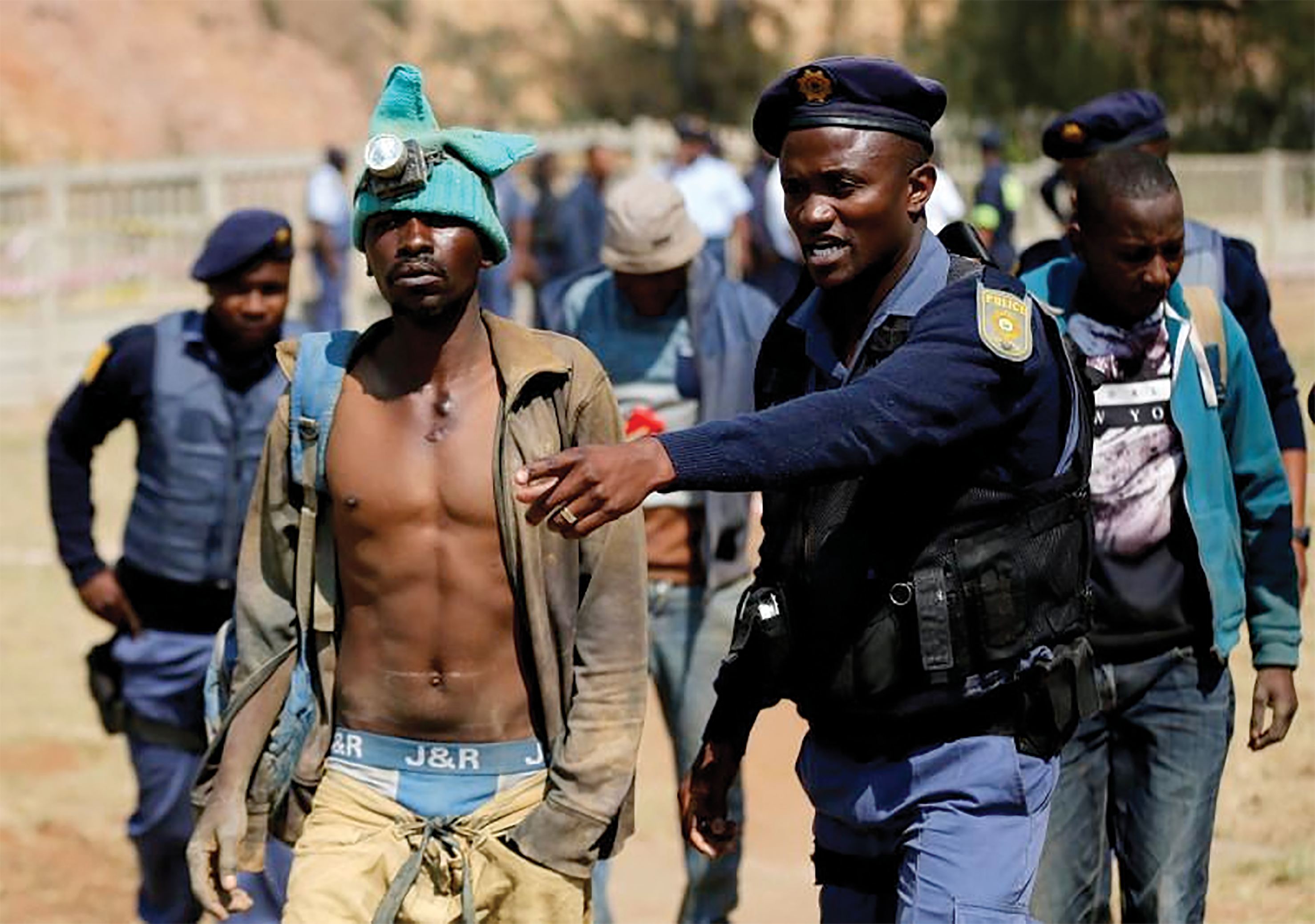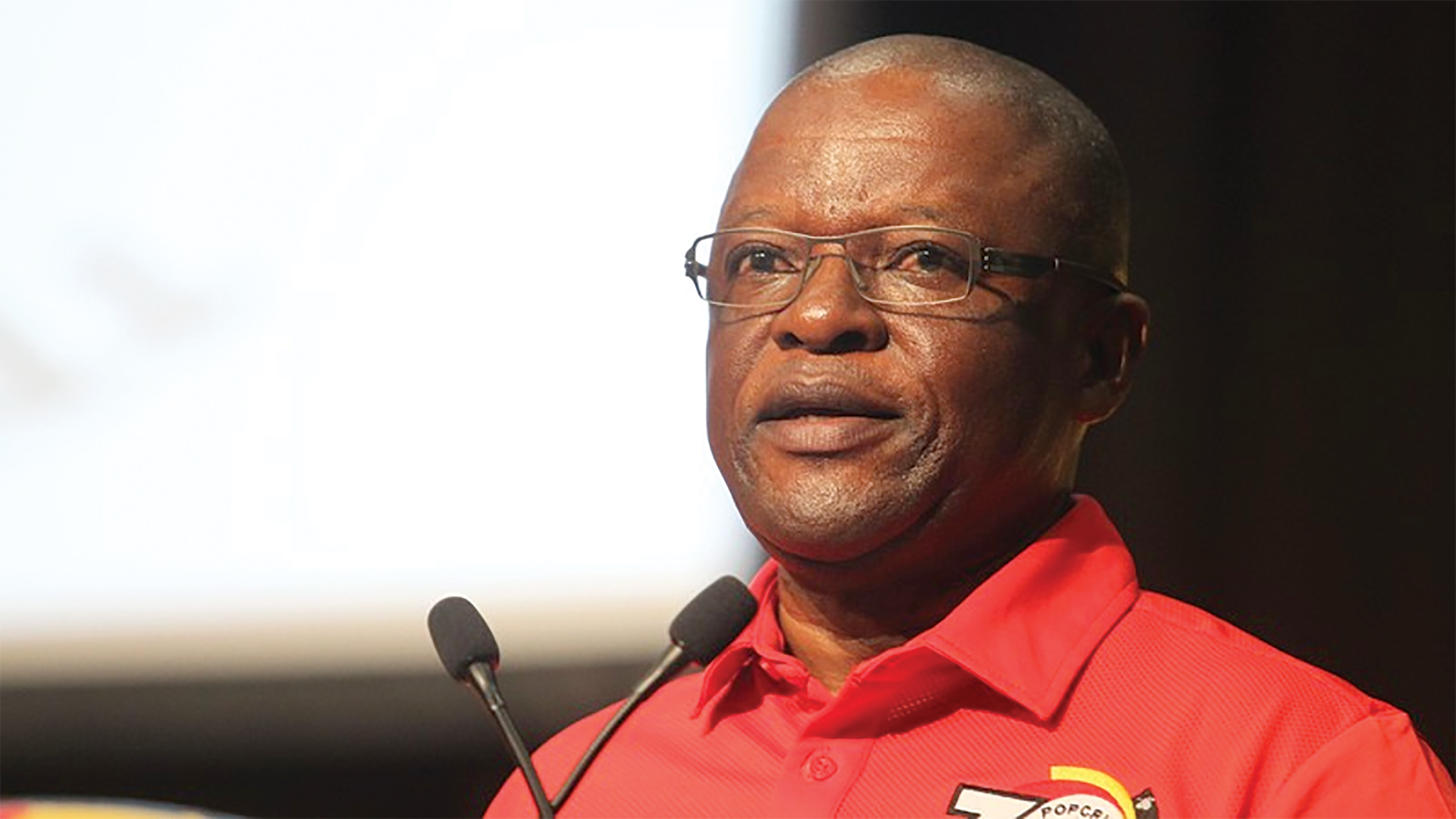Avoid: Urgent action is needed to avoid infrastructure destruction and widespread criminality
By Isaac Moledi
 The government must either rehabilitate or properly close abandoned mines and use effective regulations to address the ongoing pervasive issue of illegal mining which has, amongst others, resulted in violent gang wars and destruction of municipal infrastructure.
The government must either rehabilitate or properly close abandoned mines and use effective regulations to address the ongoing pervasive issue of illegal mining which has, amongst others, resulted in violent gang wars and destruction of municipal infrastructure.
Failure to address this burning issue could result in an unprecedented disaster. This advice comes from the Police and Prisons Civil Rights Union (Popcru) which emphasized the need for urgent action to avoid the ongoing infrastructure destruction and decay, widespread criminality resulting in among others, high death toll among illegal miners themselves and the surrounding communities as well as significant economic losses for the country.
Popcru president, Dr Zizamele CebekhuluMakhaza, says the police and prison outfit is highly concerned about the current developments in the activities of those involved in illegal mining as their action not only affect the illegal miners themselves but also communities with serious effects felt throughout the economy.
If this trend is not urgently halted, the country may face another disaster. The incidents of illegal mining has led to a high levels of death toll among illegal miners and the surrounding communities, significant economic losses for the country and widespread criminal activity, necessitating an increase in police presence, specialized training and interdepartmental cooperation to effectively combat this multifaceted problem.
Mining experts also believe that illegal mining has become an increasing threat to communities, industrial and state security. Reports of turf wars between rival gangs or shootouts between illegal miners and security officers have also become commonplace with recent incidents pointing to a spike in the scale of illegal activity, conflict and criminality.
For instance, in October 2021, about 300 illegal miners, known as “zama zamas”, attacked and shot at police and security officers when the officers tried to prevent them from delivering food parcels to underground miners. In June 2022, about 150 illegal miners stormed gold miner SibanyeStillwater’s shaft near Randfontein in an attempt to gain control. And recently, South Africans have been reeling at the horrific robbery and gang rape of a film crew at a mine dump close to West Village, a suburb of Krugersdorp on the West Rand.
In another incident recently, a gas explosion in the Free State killed 31 illegal miners and a gas leak explosion killed 17 people at an informal settlement in Germiston. On September 4 this year, large numbers of illegal miners were killed in gang-related attacks and countless more have died in underground rockfall incidents over the years.
Beyond the immediate dangers to human life and health, Popcru says illegal mining poses severe threats to surface and groundwater resources, air quality and sensitive ecosystems. In addition, the illicit activities of the many thousands of zama-zamas is costing South Africa billions of rands each year.
“The question of zama zamas is a pressing issue that requires our urgent attention to resolve. The government needs to address this pervasive issue urgently before disaster strikes again,” says Cebekhulu-Makhaza.
Besides occupying abandoned mine shafts and waging open gang warfare in the streets, Cebekhulu-Makhaza says zama zamas damage municipal infrastructure, weaken road foundations, rob homes and take tools from backyards, sheds and garages and steal electrical cables to sell on the growing illegal copper market.

South Africa’s exceptionally high unemployment levels which continue to drive more people to a life of crime, as well as many illegal immigrants that flee from their poverty-stricken countries to seek a better life in South Africa, as among many potential causes for the growing illegal mining and the untold suffering and killing of people.
According to Cebekhulu-Makhaza, substantial demand and high prices for precious metals, together with an extensive network of abandoned and disused mines in South Africa, have given rise to a profitable black market for minerals such as gold, platinum and diamonds. Traders face very few barriers in smuggling their goods to sell in international markets.
But perhaps the most significant factor allowing these criminals to go about unchecked, he says, is a lack of effective regulation and enforcement.
“Too many illegal miners have gotten away with their crimes for too long, simply because there are too few police on the ground capable of dealing with these dangerous individuals”.
With just over 120,000 sworn police officers in South Africa compared to an unknown quantity of illegal miners, possibly upwards of 30,000, Cebekhulu-Makhaza says that this is a clear indication of how our police service is greatly outnumbered and spread very thin.
He called for the increase in the “number of boots on the ground”, and to better equip the officers. He also called for more officers to be allocated to patrolling mining areas, which he cautions however that the move should not come at the expense of other police work, given the severity of crime in our country.
According to him, it is crucial that other government departments and agencies such as Home Affairs and the Boarder Management Authority step in to help fight this war on multiple fronts.
The Department of Mineral Resources and Energy (DMRE) must implement, improve, and enforce mine rehabilitation protocols where necessary, or take up the responsibility of rehabilitating or properly closing and securing abandoned mines, says Cebekhulu-Makhaza.
Use laws to achieve economic inclusivity
Help: Thousands of South Africans must be helped to own businesses and participate in the economy
By Sy Makaringe
Laws were used to ensure economic exclusivity in South Africa; it would take laws to ensure inclusivity, development economist Dr Nthabiseng Moleko told participants at The Interfaith Forum of South Africa (TIFSA) three-day conference in Boksburg today (Tuesday, 10 October 2023).
The conference was convened by various faiths and traditions to seek solutions to many challenges afflicting South Africa, including the growing levels of poverty, the high rate of unemployment, crime, crumbling public infrastructure, load shedding and water shedding.
Speaking under the theme “An Inclusive Economy (Building an Economy for All”, Moleko, a senior lecturer at the University of Sellenbosch Business School, said there was a need to bring people who were outside without removing those who were already inside.
She said it was quite surprising, though, that beneficiaries of the Broad-Based Black Economic Empowerment Programme, (which was created by an Act of parliament), kept quite when the programme came under attack from organisations such as AfriForum and others.
“Growth through redistribution is necessary. We need to ensure that there are hundreds of thousands of South Africans owning small businesses. We need to forcefully participate in the economy. We have to use our hands and encourage young people to go to vocational and training colleges,” Moleko.
Earlier she said Ethiopia, the DRC, Ivory Coast, Mozambique, Tanzania and Rwanda were the fastest-growing economies in Africa with their GDPs ranging from 7% (Mozambique) and 9.50% (Ethiopia).
“Why is South Africa on 0,03% growth,” she asked. She said the answer lay in the fact that the country’s economy was driven by consumption and exports.
Moleko said there was an urgent need for South Africa to change its structural growth path by increasing its agricultural and manufacturing output and multiplying that growth into communities. She said many countries that had the highest GDP were highly industrialised mechanised.
“Industrialisation is not negotiable. We need a trade policy and our manufacturing sector needs to be boosted,” she said.
Speaking virtually from Santiago, Chile, leading South African businesswoman and CEO of Wipcapital Gloria Serobe said the lack of security of tenure in rural areas could no longer be used as an excuse not to invest in their development.
She said this on the back of the success of the Cantane-Mbashe Agricultural Initiative in the Eastern Cape, where 2 400 households are using 2 500ha of previously unused land to plant soya beans and yellow and white maize with the support of her black-owned investment company, Wiphold, and the backing of the local traditional leaders.
“Rural people do not want to live in shacks in big cities. They want to be at their respective homes in the rural areas. They have arable home and beautiful rains in communities,” Serobe said.































